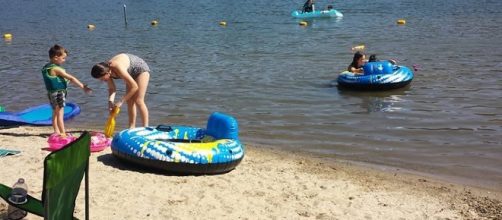Microbes are our planet’s garbage disposal system. They take care of what nature and wildlife leave behind. The human body is filled with microbes including E. coli. These microscopic, single-celled organisms are far older than humanity and date back 3.5 billion years.
A toxic legacy
Escherichia Coli 0157: H7, which has been found on the beaches and in the shallow water of Lake Wildwood, produces a powerful toxin that can cause hemorrhagic bloody diarrhea and occasionally kidney failure, and if not caught soon enough, E. coli 0157:H7 can even cause death.
This type of E. coli is found in the lower intestine of warm-blooded organisms and it literally eats waste. Most E. coli strains are harmless, but 0157:H7 is not one of them. In 2005, a study done by Lake Wildwood found E. coli significantly above normal at Meadow Park Bridge and at Wildwood and Deer Creek. It was strongly recommended at that time that coliform sampling should be continued with more intensive sampling at the beaches during the summer months, which, according to the administration, was done in 2017 by the county and not the association.
In the association's first email we read:
"We sampled the shallow water along the shoreline in addition to the somewhat deeper water in the swim zone where we usually test per USEPA approved methods.
Our results for the deeper water in the swim zone met recreational limits, as we usually see, but we observed high E. coli counts in the shallow water at some of our beaches, consistent with the County reports. E.coli grows rapidly under aerobic conditions for 3 days then declines slowly. Hopefully, today’s test results will be better than the ones before."
Finding the good
The very same microbes that make us ill can also be used to clean up some environmental disasters we leave behind. In fact, experiments are being done using genetically modified E. coli to clean up mercury contamination caused by the heavy hydraulic mining. Mercury mixed with sediment and water becomes far more toxic methylmercury.
Methylmercury accumulates in fish and moves up the food chain. Methylmercury is found in most gold country lakes, rivers, and streams, which is why fishing is catch-and-release only.
Genetic engineering can give E. coli metal-binding peptides that will hold heavy metals in a death grip ultimately absorbing, binding, and jailing methyl-mercury rendering it far less harmful. Warning signs about eating mercury-laden fish can be found just about everywhere in California.
In the 19th century, gold miners diverted water and used high powered hoses to liquidate entire mountainsides. The slurry was then run through sluice boxes with mercury at the bottom.Miners would then burn off the mercury and the gold was collected.What was left of the mercury went into the watershed where bioaccumulation can be harmful if too much fish is eaten by human beings.
Eating mercury can cause a variety of problems, but it is most harmful to pregnant women and those who are breastfeeding.
Bioremediation using E. coli
Something good can come from something bad. Bioremediation is taking a common bacterium found everywhere in nature and amplifying its garbage disposal eating abilities so the bacteria will destroy a specific waste it comes into contact with. Finding an E. coli bacterium is simple and it turns out that genetic manipulation of E. coli is pretty straight forward as well. Scientists have modified E. coli bacteria with genes that will allow them to live in a mercury environment and then tweaked the microbe again to allow E. coli to accumulate large amounts of mercury, therefore, isolating it and effectively disabling the metal.
The outlook is hopeful that many of our rivers, streams, and lakes may be cleared of unintended consequences to hydraulic mining.
As are most things in life, E.coli is good and bad. If the bacteria can be safely modified to clean up our watershed then it becomes a gift as well as a curse. Hopefully, the children and their families harmed by the LWW E.coli contamination as doing well. All of our thoughts and good wishes go out to them.


